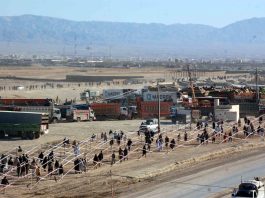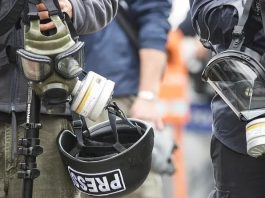A societal push against misuse/abuse of blasphemy laws in Pakistan is on the rise, slowly and gradually.
ISLAMABAD: Three days after the brutal killing of Mashal Khan, a 25-year-old student of journalism at Abdul Wali Khan University of Mardan (AWKUM)in April 2017, on hearsay accusation of blasphemy, a big number of people from different walks of life gathered in Zaida, hometown of the victim, and protested against his lynching.
The rally in Zaida, comprising of local residents, political workers, students, teachers and different civil society groups, protested against lynching of Mashal. Marching in the main bazaar of the town, protestors enchanted slogans calling “justice for innocent Mashal.” It was first time that such a village in the tribal-cultured province of Khyber Paktunkhawah (KP), people got up against blasphemy laws misuse and condemned mob violence against the accrued persons. They also expressed solidarity with the family of Mashal.
On April 13, a large number of students and employees of AWKUM teamed up outside journalism department and started accusing Mashal, a brilliant and outstanding student of the campus according to his teacher, of blasphemy. Later, they forcibly entered the department office, smashed windows and doors, and thrashed a friend of Mashal questioning his faith. “I was standing in the lab when students started gathering. They were furious and they were saying Mashal does not believe in Allah and Prophet Muhammad (PBUH),” Umair Khan, a student of journalism said.
The violent mob, later, marched towards the boarding of the university, which is almost a kilometer away from the department, went three floors up and dragged Mashal, who had locked himself in the room to save his life, to the ground and beaten him to death with fists, sticks and bricks in front of a police squad and university security guards.
“We never heard of any such thing about Mashal. There is no complaint or evidence against him,” Shiraz Paracha, chairman Journalism Department of AWKUM said.
“The initial information and inquiry proved that Mashal was not involved in alleged blasphemy. He, according to our information, criticized some policies of the university administration just a few days before the accusation was leveled against him,” Dr Said Mehsud, a political activist, who was present at the rally told News Lens Pakistan. He said even then nobody in society has right to take law into hand and turn violent in the name of religion.
To have a clear picture about the violence on the accusation of blasphemy in Pakistan, the Gojra Incident might be a good example.
In 2009, a violent mob of a few thousand attacked a Christian Colony in Gojra, central Punjab burning seven of a family to death after setting ablaze the whole neighbourhood.
In 2012, thousands of people beat a mentally-challenged man to death, and burned his corpse after he was accused of desecrating the holy Quran in district Bahawalpur in Southern Punjab. The attackers stormed a police station where the man was being interrogated and took him in their custody. There is no full-stop yet.
The blasphemy laws in Pakistan were amended by a military dictator general Ziaul Haq with severest punishment in 1980s. Sections 295A, B, and C were added in Pakistan Penal Code (PPC) with introducing up to 10 years’ imprisonment for derogatory remarks against holy personalities of Islam, life-imprisonment for desecrating Holy Quran and death penalty on uttering derogatory remarks against Prophet Muhammad (PBUH).
The number of reported extra judicial killings of blasphemy accused persons in Pakistan from 2005 to 2017 is more than 70, according to Centre for Research and Security Studies (CRSS), a think tank focusing on extremism.
The ratio of lodging blasphemy cases multiplied from a few to hundreds after the new amendments with strict punishment, National Commission for Justice and Peace, a church-run non-government organization highlighted in its report.
Following the death of Mashal Khan, there have been numerous debates on Pakistani television channels highlighting misuse of blasphemy; civil society groups protested and a large number of people from different walks of life expressed solidarity with the family of Mashal.
“Some of our neighbours and a local cleric announced publicly not to attend funeral of Mashal and condole with the family. However, after the rally, they came to us and apologized for the indifference saying they made a mistake for not standing with family,” Muhammad Iqbal, farther of Mashal told News Lens Pakistan. “This is not only my grief but grief of whole nation,” he said highlighting misuse of such laws in the name of religion. He said whole society would have to stand up and change the situation positively after the horrible lynching of his son as new realization for peace and tolerance. He said police have also lodged case against the cleric who publicly announced not to attend funeral of Mashal.
Saroop Ijaz, human rights activists and lawyer with focus on blasphemy cases, said there is the realization that this blasphemy law is misused on occasions. “What needs to be understood is that while Mashal’s case was a most horrible example of this law being used for victimization and persecution; it also represents the norms of the society. For a greater push for reform the lead has to be taken by the government and political forces and sadly we have not seen real intent for this (beyond empty, unconvincing rhetoric),” he observed
He said Mashal’s brutal lynching has acutely spotlighted the violent and horrific consequences of the misuse of the blasphemy laws. The fact that “blasphemy” is used as an instrument of violence and persecution for personal reason. It is now becoming apparent to many and there is a hope that this could lead to an honest national conversation and eventually reform, he added.
“The real challenge in improving the situation is mindset. We have to make bold decisions and do soul searching rather ignoring the issue,” Paracha seconded Ijaz.
The campus of the university is opened after six weeks amid protests calling justice for Mashal. Father of Mashal on the opening of the campus also called for justice alleging the university’s administration for planning this violence in the name of blasphemy.
“AWKU administration killed my son for hiding irregularities of their officials and accused him of committing blasphemy to avoid accountability,” Iqbal said in his officially recorded statement before police too.



